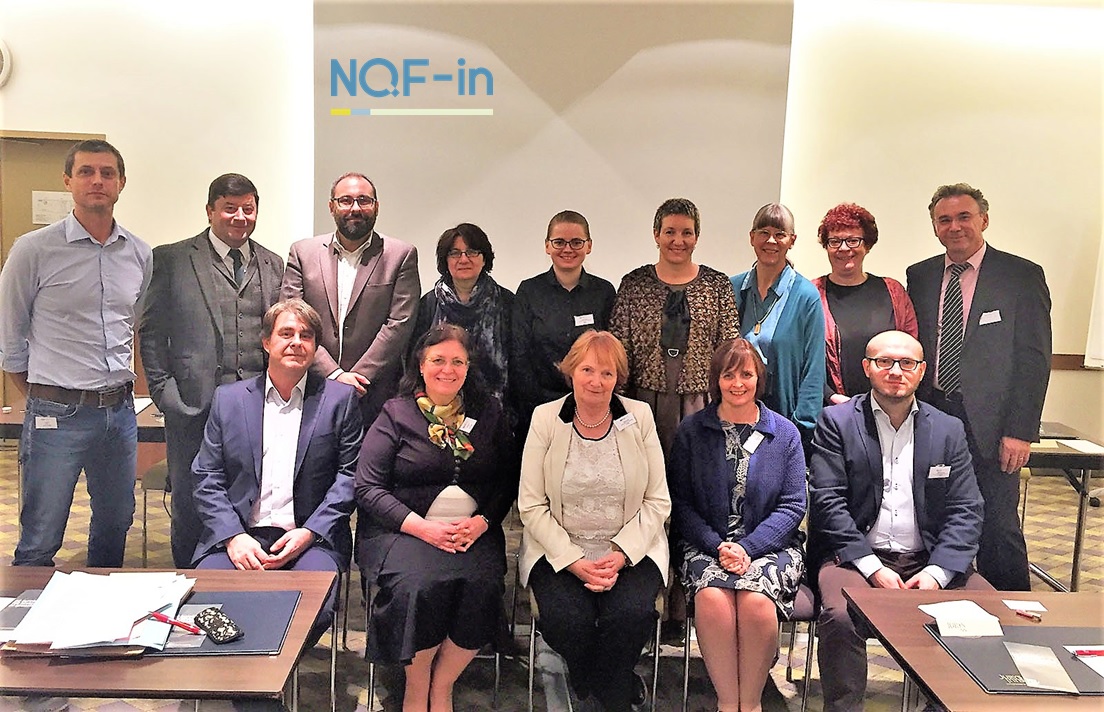NQF-in Project partners took advantage of their presence in Prague for the conference on how countries include non-formal sector qualifications in NQF-based qualifications systems to hold their 5th NQF-in Project Meeting on November 10, 2017. The meeting was hosted by the National Institute for Education of the Czech Republic, under the auspices of the Erasmus+ project “Developing organisational and financial models for including non-formal sector qualifications in National Qualifications Frameworks”.
Representatives of all seven project partners participated in the meeting: Anne Murphy, Dublin Institute of Technology, Ireland; Zoltán Loboda, Educational Authority, Hungary; Ivana Carev, Mile Dželalija University of Split, Croatia; Matteo Sgarzi, Josiane Paddeu, Alexandre Meliva, Centre for Research on Qualifications (Céreq), France; Jan Brůha and Viola Horská, National Institute for Education, Czech Republic; Sheila Dunn and Anthony O'Reilly, Scottish Credit and Qualifications Partnership, Scotland; Horacy Dębowski, Sylwia Walicka, Barbara Przybylska, Educational Research Institute, Poland.
Horacy Dębowski warmly welcomed all present and the group briefly reviewed the conference that had been held the previous day. It was agreed that the event was very successful, as evidenced by the level of engagement by participants in the discussions and the wide variety of qualifications system stakeholders present. Discussions continued long after the conference had ended.
This led into the next item on the agenda – the planned conference in Warsaw to present the models of inclusion. Partners discussed whom to invite, the institutions that should be represented and the perspective of the conference – to ensure a focus on the inclusion of non-school qualifications, and even perhaps international qualifications. It was also stated that this would be a good opportunity to hold a final meeting of project partners.
The timetable of activities was then reviewed, with emphasis on when stages of work on the models report should be completed, issues pertaining to the organisation of the Warsaw conference, in-country seminars presenting project results and dissemination of the country reports.
Several publications and conference presentations about the project are also planned. An e-publication will be prepared of all country reports. A paper will be presented at the Bologna Process researchers’ conference in Bucharest at the end of the month. The Dublin Institute of Technology’s e-journal Level3 will issue a call for papers on the policy or practice of including qualifications/awards in NQFs. Céreq partners presented two possibilities for publishing information about project results – Céreq Brief and “Cahiers de la recherche sur l’éducation et les savoirs”, an education research journal. The country seminars were also discussed and partners were asked to send their concept notes for these events by the beginning of December.
The remaining part of the meeting was devoted to analytical work on how each country implements various characteristics of a qualifications system, such as types of qualifications included, ownership of qualifications, the legal status of the system and process of describing qualifications.
The meeting ended with a review of pending administrative issues. Sheila Dunn and Anthony O’Reilly also invited everyone to the SCQF Partnership Conference & International Study Day on the 22-23 February 2018.

Seated, from the left: Zoltán Loboda, Educational Authority, Hungary; Viola Horska, National Institute for Education, Czech Republic; Anne Murphy, DIT, Ireland; Sheila Dunn, SCQF Partnership, Scotland; Horacy Dębowski, IBE, Poland. Standing, from the left: Jan Brůha, National Institute for Education, Czech Republic; Anthony O’Reilly, SCQF Partnership, Scotland; Matteo Sgarzi and Josiane Paddeu, Céreq, France; Sylwia Walicka, IBE, Poland; Ivana Carev, University of Split, Croatia; Barbara Przybylska, IBE, Poland; Christiane Eberhardt, BIBB, Germany; Mile Dželalija, University of Split, Croatia.
